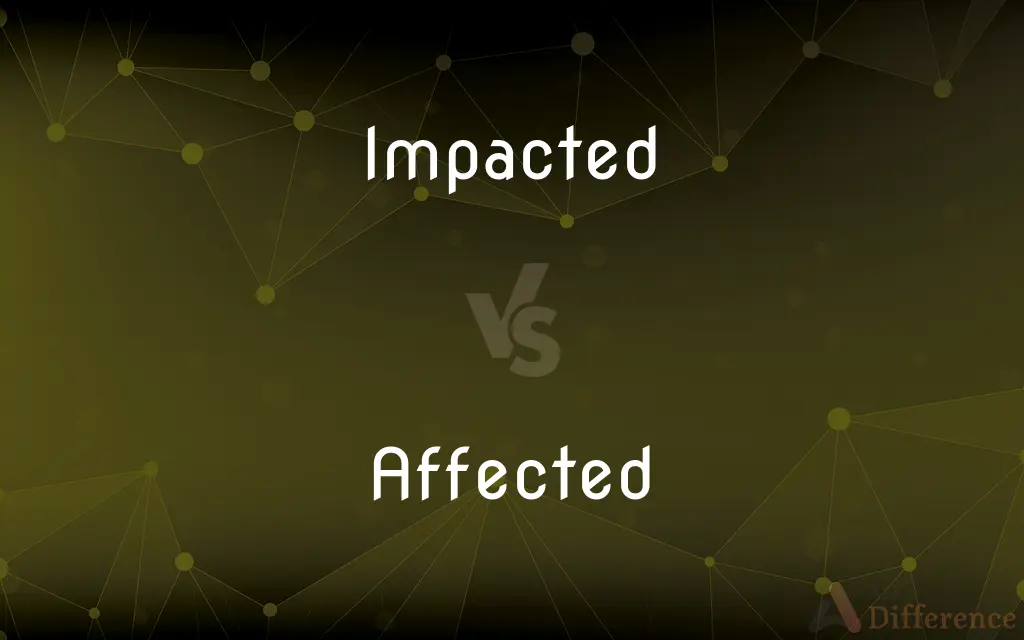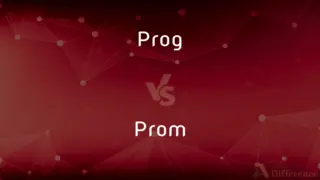Impacted vs. Affected — What's the Difference?
By Maham Liaqat & Urooj Arif — Updated on March 26, 2024
Impacted refers to a direct and often forceful influence, whereas affected encompasses a broader range of influences, including indirect or subtle changes.

Difference Between Impacted and Affected
Table of Contents
ADVERTISEMENT
Key Differences
The term "impacted" is used when discussing scenarios where there is a direct, and often significant, force or influence exerted on something or someone. On the other hand, "affected" is a more encompassing term that includes being influenced or changed by something in any manner, whether directly or indirectly, significantly or subtly.
While "impacted" often implies a more intense or powerful effect, "affected" covers a spectrum of influence from mild to profound. The choice between "impacted" and "affected" depends on the context and the extent of influence one wishes to convey. In scientific or technical contexts, "impacted" can have very specific meanings (e.g., an impacted tooth is one that is blocked from emerging).
In terms of emotional or psychological influence, "affected" is more commonly used. Emotional states or feelings are typically described as being affected rather than impacted, given the subtle and complex nature of psychological changes. However, in the case of a significant event that causes a profound or immediate change in psychological state, one might say it had an "impact."
The use of "impacted" has grown in popular usage, often interchangeably with "affected." However, careful speakers and writers may choose "impacted" to emphasize the strength or immediacy of an effect, reserving "affected" for situations where the influence is broader, more varied, or less immediate.
Comparison Chart
Definition
Refers to being influenced in a direct and forceful manner.
Encompasses a broader range of influences, including indirect changes.
ADVERTISEMENT
Intensity
Often implies a stronger or more immediate effect.
Can indicate a wide range of effects, from subtle to profound.
Usage
Used when the effect is direct and significant.
Used for both direct and indirect influences.
Examples
Natural disasters impacting an area, policy changes impacting a community.
Mood affected by weather, confidence affected by economic conditions.
Contexts
Common in discussions about physical, immediate effects.
Common in emotional, psychological, and broad-ranging influences.
Compare with Definitions
Impacted
To be pressed closely together; compacted.
The sediment was impacted over millennia.
Affected
To be moved or touched by an emotional experience.
She was deeply affected by the novel.
Impacted
Subject to a forceful effect or change.
The new tax law impacted small businesses the hardest.
Affected
To have an impact on, in a broader sense.
Climate change has affected global weather patterns.
Impacted
To be blocked or obstructed.
An impacted tooth may require surgical removal.
Affected
To exhibit a change in condition as a result.
The crops were adversely affected by the lack of rain.
Impacted
Directly influenced in a significant manner.
The asteroid impact significantly impacted the climate.
Affected
To pretend to have or feel something.
He affected indifference, but was clearly upset.
Impacted
To have a strong, immediate effect on.
The sudden economic downturn impacted the company's revenues.
Affected
Influenced or touched by an external factor
Affected areas
Impacted
Wedged together at the broken ends. Used of a fractured bone.
Affected
Artificial, pretentious, and designed to impress
The gesture appeared both affected and stagy
Impacted
Placed in the alveolus in a manner prohibiting eruption into a normal position. Used of a tooth.
Affected
Disposed or inclined in a specified way
You might become differently affected towards him
Impacted
Wedged or packed in, so as to fill or block an organ or a passage
Impacted feces.
Affected
To have an influence on or effect a change in
Inflation affects the buying power of the dollar.
Impacted
Simple past tense and past participle of impact
Affected
To act on the emotions of; touch or move.
Impacted
Having undergone an impact.
Affected
To attack or infect, as a disease
Rheumatic fever can affect the heart.
Impacted
(dentistry) Of a tooth, subject to dental impaction.
Affected
To put on a false show of; simulate
Affected a British accent.
Impacted
Having lost property revenue due to Federal presence, such that it may receive impact aid.
Affected
To have or show a liking for
Affects dramatic clothes.
Impacted
Driven together or close.
Affected
(Archaic) To fancy; love.
Impacted
Grown in an abnormal direction so that it is wedged against another tooth and cannot erupt normally; - of teeth, especially the third molar; as, to extract an impacted third molar.
Affected
To tend to by nature; tend to assume
A substance that affects crystalline form.
Impacted
Wedged or packed in together;
An impacted tooth
Affected
To imitate; copy
"Spenser, in affecting the ancients, writ no language" (Ben Jonson).
Affected
Feeling or emotion, especially as manifested by facial expression or body language
"The soldiers seen on television had been carefully chosen for blandness of affect" (Norman Mailer).
Affected
(Obsolete) A disposition, feeling, or tendency.
Affected
Acted upon, influenced, or changed.
Affected
Emotionally stirred or moved.
Affected
Infected or attacked, as by disease.
Affected
Assumed or simulated to impress others
An affected accent.
Affected
Speaking or behaving in an artificial way to make an impression.
Affected
Disposed or inclined.
Affected
Influenced or changed by something.
The affected products had to be recalled.
Affected
Simulated in order to impress.
He spoke with an affected English accent.
Affected
Emotionally moved; touched.
Affected
Adfected.
An affected equation
Affected
Resulting from a mostly negative physical effect or transformation.
Affected
Artificial, stilted
Affected
Someone affected, as by a disease.
Affected
Simple past tense and past participle of affect
The thunderstorm affected the compass, and we got lost.
Affected
Regarded with affection; beloved.
His affected Hercules.
Affected
Inclined; disposed; attached.
How stand you affected to his wish?
Affected
Given to false show; assuming or pretending to possess what is not natural or real.
He is . . . too spruce, too affected, too odd.
Affected
Assumed artificially; not natural.
Affected coldness and indifference.
Affected
Made up of terms involving different powers of the unknown quantity; adfected; as, an affected equation.
Affected
Acted upon; influenced
Affected
Speaking or behaving in an artificial way to make an impression
Affected
Emotionally affected;
Very touched by the stranger's kindness
Common Curiosities
Can "affected" imply a positive change?
Yes, "affected" can refer to positive, negative, or neutral changes depending on the context.
How do I decide whether to use "impacted" or "affected"?
Consider the nature of the influence: use "impacted" for direct and significant effects, and "affected" for broader or more subtle changes.
Is it correct to use "impacted" in place of "affected"?
While increasingly common in casual usage, using "impacted" for "affected" may not always be precise, depending on the intended nuance.
Can a person be both impacted and affected by an event?
Yes, a person can be directly and significantly influenced (impacted) by an event while also experiencing broader, more subtle changes (affected).
How do changes in language affect the use of "impacted" and "affected"?
Language evolves with usage, and the increasing interchangeability of "impacted" and "affected" reflects broader trends in English language evolution.
Is "impacted" always more serious than "affected"?
While "impacted" often implies a more significant effect, the seriousness also depends on the context and the extent of the influence.
Can a psychological state be impacted?
While more commonly described as affected, significant or traumatic events can be said to impact a psychological state, especially if the effect is immediate and profound.
Is it accurate to say a law affects or impacts people?
Both can be correct, depending on the context: a law affects people in general (broad influence), but it may impact certain groups more directly (specific, forceful effect).
Can inanimate objects be affected or only impacted?
Inanimate objects can be both affected and impacted, depending on the nature of the influence (e.g., weather affecting metal through rust, construction impacting a landscape).
Are there contexts where only one of the terms is appropriate?
Yes, in specific technical or medical contexts, "impacted" may have a precise meaning where "affected" would not be interchangeable.
How does the intensity of an event determine the use of impacted vs. affected?
The intensity and directness of an event's influence might lean towards using "impacted" for more forceful effects and "affected" for less intense, broader influences.
How do medical professionals use "impacted"?
In medicine, "impacted" is often used to describe a condition where something is firmly lodged in a place, such as an impacted tooth.
Can societal changes be both impacted and affected by technology?
Yes, technology can directly impact certain aspects of society (e.g., job displacement due to automation) and broadly affect societal behaviors and norms (e.g., communication methods).
Is there a difference in the emotional connotation between impacted and affected?
"Affected" might carry a broader emotional connotation, applicable to subtle emotional changes, whereas "impacted" suggests a more forceful or significant emotional effect.
Can environmental issues be described as impacting or affecting the planet?
Environmental issues can both impact (direct and significant effects) and affect (broader changes) the planet, depending on the specific context and extent of influence.
Share Your Discovery

Previous Comparison
Croise vs. Cruise
Next Comparison
Prog vs. PromAuthor Spotlight
Written by
Maham LiaqatCo-written by
Urooj ArifUrooj is a skilled content writer at Ask Difference, known for her exceptional ability to simplify complex topics into engaging and informative content. With a passion for research and a flair for clear, concise writing, she consistently delivers articles that resonate with our diverse audience.














































